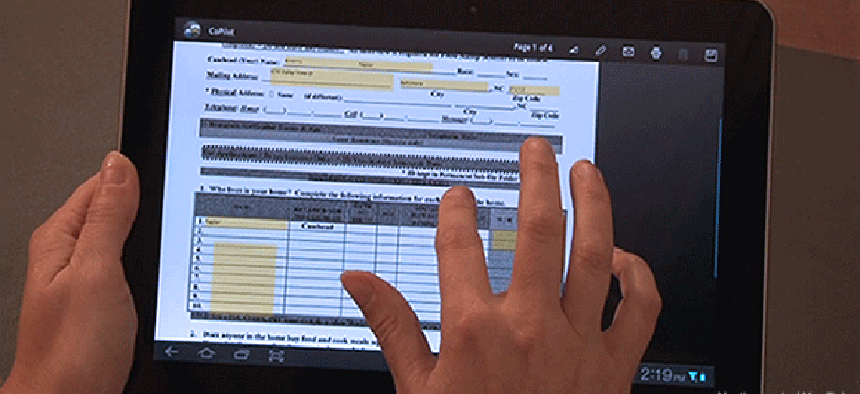Tablet suite saves case workers their most valuable commodity

Social workers in Fairfield County, Ohio, no longer have to schedule "paperwork days" after adopting Compass CoPilot for tablets.
Few employees have to be on the move as much as a government case worker in a county child protective or family services office. Unfortunately, many of these offices still use physical files that require the worker to return to the office up to several times a day to keep them up to date. Those offices that have partly moved to electronic files are not always equipped to handle workers making updates remotely.
Nevertheless, these workers are expected to make all appointments, return phone calls promptly and completely document their activities.
"The staff must provide documentation for each and every activity they perform," said Heather O'Keefe, director of operations for Child Protective Services in Fairfield County, Ohio. Those documents are entered into Ohio's Statewide Child Welfare Information System. "Many times managers and case work staff need to schedule ‘paperwork days' simply to keep up with the need for documentation to be entered in a timely manner and to have dedicated time to achieve this end," O'Keefe said.
In an effort to keep its employees' heads above the sea of paperwork and allow them to spend more time actually working on their cases, Fairfield County is turning to a mobility solution. Northwoods' Compass CoPilot suite seemed a logical choice -- and not just because the company is headquartered in the next county over (in Dublin, Ohio). The tablet app suite helps workers use their time most efficiently, by keeping notes, dictation recordings and photos all in one place and tagged by case.
CoPilot is an adaptation of the company's Compass Software. Designed to work with Android tablets, it gives workers forms automation, document capture and management, case management tools and secures their data with 128-bit AES encryption, according to Northwoods.
Before using the suite, when a case worker needed a particular form there were two options: either haul around a folder containing upwards of 300 different forms, or go back to the office to get it. Now they can use Compass Forms application to call up the correct form, which can then have case information automatically filled in, and have family members sign it electronically. In addition, documents can be photographed in the field instead of taking the original back to the office to scan it. Photos can be taken by the tablet device and then captioned immediately, while case and GIS info is tagged automatically. This is a vast improvement over printing out the photo, writing the caption and physically attaching it to the case file.
When workers do go back to the office, they dock their tablet and sync the information about their cases with the enterprise system. This eliminates the time it would take to file information and reduces the chance of errors, O'Keefe said. When workers undock and head into the field, they will have the most up-to-date information about their cases with them in their tablets.
The new system has some organizational benefits that managers can take advantage of as well. "As the result of all staff having a tablet, they are now utilizing an Internet-based calendar for scheduling of all meetings and appointments," O'Keefe said. "Each manger has access to the schedule of their workers and can easily determine where staff are in the field, who may be in a given area that we need someone to respond to a call, or simply to schedule appointments or meetings for staff as needed, as the manager is aware of their availability."
That eliminates a lot of back-and-forth e-mail and phone calls back, she said. As well, managers say that documents are more complete and timely, and staff members say they fell more "caught up" and therefore less stressed, she said.
Giving the case workers the ability to enter and update information remotely gives them more time to meet with families. "Overall, staff have indicated a time savings of anywhere from an hour a day to feeling as if they gain a day and a half to two additional days a week in time saved," O'Keefe said.
Staff members can work on their tablets while biding time at court or in a waiting room while a child is vising a counselor or doctor. "Staff can use the tablet to complete documentation of a court hearing during the hearing itself or while at a home visit," she said. "The potential for time saving is overwhelming, and staff continues to report new ways of saving time each day."
In addition to the time savings, there is the additional benefit in that the workers are more readily able to engage with the families and children that they serve. As O'Keefe put it, "Children are often more engaged with staff and willing to have photographs taken. Parents enjoy the ability to have staff simply photograph an item they previously would have needed to submit and have returned or appreciate that staff have access to any information needed regarding a family's case while in the field."
Compass Co-Pilot has been so helpful in improving the efficiency of Fairfield County's Child Protective Services that family services departments in other counties have also looked into using it. Recently, Northwoods and 23 Ohio counties were awarded a $100,000 grant from the Ohio Local Government Innovation Fund to research ways they can work together to make their respective department more efficient.





